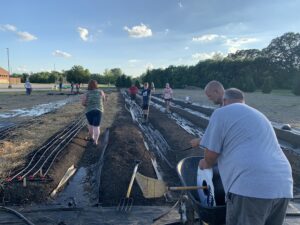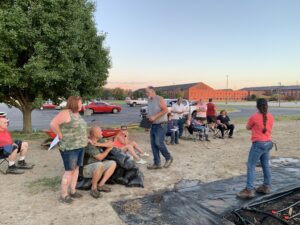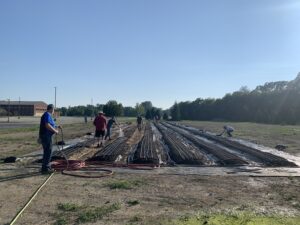Final report for ENC20-190
Project Information
The Mansfield Microfarm Project (MMP) is a community-university collaborative to create economic development through sustainable microfarming (small-plot, high-intensity organic agriculture) in post-industrial urban spaces. Piloted in Mansfield, Ohio and in its second year, MMP cultivates a cooperative urban production, aggregation, marketing and advocacy system that enables small-scale producers to compete in wholesale specialty-crop markets. With initial funding from the Foundation for Food and Agricultural Research (FFAR), MMP leveraged OSU expertise to develop, research, and implement the production system of microfarm-based specialty-crops in various settings. Now, the Richland Gro-op (RGO), a cooperative of microfarmers established in 2019, seeks to partner with Ohio State and NECIC to create a training program for low-opportunity novice producers in order to grow co-op membership in the future. This proposal would provide the personnel and supplies to formalize a comprehensive training program, develop it into a module to train additional trainers, implement it with at least two cohorts of beginning farmers in Mansfield, and formally evaluate the program’s efficacy and impact. Anticipated outcomes include increased knowledge and skills regarding sustainable microfarming, organic farming and business management skills among participants and trainers; creation and implementation of farms by program graduates using environmentally sustainable and sound business practices; and a durable new urban food production system, through the marketing cooperative with new farmer-members equipped with the training and support to succeed. This funding will enable MMP project staff to hire and train the appropriate partners to develop, deliver, and disseminate a sustainable microfarming training program.
The Curriculum Development phase will result in a replicable curriculum for entry-level microfarmer training and a train-the-trainer module. We will create internet and hard copy versions, as well as a catalog of training materials, that include best practices for small-plot sustainable agriculture, food safety guidelines (GAP), recordkeeping templates, and worksheets for crop plan, budgeting, and business plans.
Recruitment activities will target 20 applicants each for years 2021 and 2022, and we aim to accept ten entry-level farmers into the program each year, targeting individuals who live in low-economic opportunity areas in Mansfield. Outputs will include the program application and a rubric for evaluating/assessing applications.
Programmatic outputs include implementation of two years of a ten-month training program for entry-level farmers that include regular (minimum: bimonthly) workshops and a mentored production experience (ten participants each year), as well as a minimum of twelve continuing education trainings for RGO growers (target attendance: ten growers per workshop). Partnerships will also be outputs of the training program implementation. These partnerships include OSU-Mansfield, OSU Extension, the Ohio Ecological Food and Farm Association, the Richland Gro-op, IdeaWorks, and Business mentors (from the USDA, Farm Bureau and Farm Credit).
The program process and outcomes evaluation will have the following outputs: pre-, mid-, and post-assessment materials and results for program participants and training educators for each implementation year. Additional outputs will be interview protocols and interview results for program participants and training educators for each implementation year, to serve as tools for the ongoing feedback loop for continued program improvement. There will also be annual program evaluation reports, including recommendations for curriculum and programmatic improvements, program process, and outcomes evaluation. These outputs will provide current team members and future adopters with tools and resources that will inform the annual refining of the curriculum, resulting in updated curriculum and program materials each year and for other groups seeking to use the content. This is an iterative process that will repeat each year by any user.
One last output relates to developing the ongoing support for the microfarm system and practical agricultural knowledge exchange within the Mansfield community and its related entities — local governments, school systems, and potential business buyers such as healthcare systems. One challenge is the need to sustain the education program coordinator in the long-term beyond this grant; this will require collaboration, built upon the open-door inclusion of these audiences. When this occurs, the following partnerships will be the main output from this activity: Richland County Extension office, State Extension leadership, Richland County Commissioners and other local governments, NECIC, Mansfield City Schools and OSU Mansfield.
Cooperators
- - Technical Advisor
Education
The curriculum being developed and field tested is designed to provide new and beginner farmers with a foundation in small business development and management, cooperative membership and management, and commercial crop production such that they can launch their own microfarm business and participate in a crop-plan-based aggregation cooperative. This is approached through a combination of classroom, field-based, and hands-on activities. Classroom work provides an overview of the microfarming system and several of its critical components -- commercial production, farm and business management, and cooperative farming -- before students move to a "farming bootcamp" comprised of three consecutive seasons of crop production during which they become responsible for cultivating ever more challenging crops on an increasing scale each season. Hands on lessons in use of small farm tools and implements, farm site management, mechanical planting, irrigation systems, integrated pest management, cultivation tools and techniques, harvesting practices, and more take place throughout each growing season confronting students with real life crop management problems and challenges with measured results. Students learn together on a large training farm to help cultivate a community of practice around microfarming where future members of a shared cooperative developed knowledge, skills, language, and experience together to acquire a shared repertoire and a living context for mutual engagement. We aid them in creating business plans and incorporating microfarm businesses and we facilitate their creation of a farmer-owned cooperative in order to help them into the institutional architecture that will them succeed as farmers.
Education & Outreach Initiatives
Community event designed to be informational about microfarming system and potential for interested families and individuals to participate in training and the potential for partnerships development around system needs and assets.
More than 100 community residents and local businesses joined the event which consisted of an overview of microfarming and training and three sets of break-out sessions organized around the community needs to launch the training program.
Community members learned about the microfarm training opportunity, several businesses and the public schools became key partners in acquiring land access and training site. Several participants expressed an interest in undertaking the training.
To recruit up to twenty interested new or beginning farmers to participate in the microfarm training program.
This event featured a dinner provided by local restaurants and caterers interested in becoming buyers from a local produce cooperative, a detailed overview of the training program, it's components, and its time commitments, and a lengthy q&a with several of the working microfarmers who participated in the first round of trainings in Mansfield. More than 130 people attended, over half expressed an interest in participating in the trainings. Since then, and as expected, that number has been reduced to 15 committed participants.
We learned that in order to find enough people for whom a small farm business seems appealing we needed to cast a very wide net. However, the result exceeded our minimum expectations for ultimate enrollment.
To train a cohort of microfarmers to operate their own microfarm business and participate in and help manage their own member-owned cooperative in Marion, Ohio.
This was our opportunity to field-test our curriculum revisions.
Community members learned about the microfarm training opportunity, several businesses and the public schools became key partners in acquiring land access and training site. Several participants expressed an interest in undertaking the training.
We learned that in order to find enough people for whom a small farm business seems appealing we needed to cast a very wide net. However, the result exceeded our minimum expectations for ultimate enrollment.
To complete the training of recruited beginner and new entry farmers in Marion, Ohio
During 2023 we implemented the second year of the microfarm farmer training program. Between 2022 and 2023, our cohort was reduced in number from 16 farm businesses or future farm businesses in training to ten. Those who left the program identified several factors leading to the withdrawal. For some it was an inability to commit the time and work necessary for the training due to work or other financial demands. For others, family obligations, especially adolescent children with multiple demands, required their time. One team, from a nearby county high school, felt that they had sufficient knowledge gained to launch their school-based microfarm - a site that would be integrated into their FFA program and producing for their food services department in the school. During the winter and spring of 2023, the remaining participants combined on farm experiential training with intensive classroom work in which they developed and completed business plans for their future microfarms and were guided in developing five-year financial plans for these businesses. They were all also introduced to the crop planning system developed by the Richland Gro-Op in Mansfield and designed to help them plan their crops according to RGO demands. Each of them developed a mock crop plan for their 2024 season and then developed a real crop plan for the 2023 season on the Harding High School microfarm. During spring and summer, trainees were expected to follow this crop plan and monitor their success using the crop plan as a guide, comparing harvest yields to crop plan estimates and using this data to evaluate their farming strategies. In June 2023, several more trainees withdrew from the program, one of them had launched a campaign for Mayor and three more cited time commitments as an obstacle. In July five of the remaining six withdrew. In this case three of the trainees felt that they had gained enough knowledge to begin their own market farms and had developed markets with food insecurity purchasing initiatives sufficient to support their operations. Two of the three also convinced two other trainees to withdraw in order to work on these new farm businesses. By autumn 2023, only one trainee remained. She is completing the whole curriculum and has joined the Richalnd Gro-Op as a new grower in 2024.
The key insights of the second year of training related to the need to provide at least some financial support for beginning farmers as they advance through the program. Unlike Mansfield, where a Foundation for Food and Agricultural Research grant supported farmer training and provided trainees with a microfarm kit at the end of the training process, Marion farmers were trained with minimal support and we did not have funding sufficient to offer a microfarm as a reward for completing the process. Conversations are underway with our partners in Mansfield and Marion to discuss and develop financial support for future training cohorts. We also believe that the financial benefits of completing the training and joining a cooperative, as opposed to immediately operating and independent farm business, were not sufficiently communicated to our most ambitious trainees. We anticipate that the farmers who left to operate their own farms independently will struggle with markets and will likely seek entry into the existing cooperative for the financial security it provides in the future.
To integrate microfarm training and agricultural education into an urban school system in Marion, Ohio.
During 2022 and 2023 we partnered with Marion City Schools to establish a microfarm on Marion Harding High School. This site was utilized for the farmer training program. This site is also now being utilized for an agricultural pathways curriculum being offered in Marion Harding High School. During 2023, Marion City Schools hired an agricultural educator and launched their educational initiative. In 2022, five students participated in the curriculum, in 2023 50 students have participated, an FFA chapter has been launched, and students are being exposed to agricultural education and the microfarm production system.
Agricultural education has been institutionalized in a city school system for the first time, exposing students at all levels to agricultural careers and providing training and knowledge sharing to high school students as part of their curriculum.
Educational & Outreach Activities
Participation Summary:
Learning Outcomes
Project Outcomes
Based on interviews with working microfarmers, we learned how to revise the curriculum to provide the right knowledge at the right time and to integrate practices for successful farming and cooperative membership directly into the training protocol.
We completed a revision of the curriculum and have begun offering it to a new cohort of microfarmers in Marion, Ohio.
All of the microfarmers who participated in our first training program in Mansfield are still working commercial farmers (https://richlandgro-op.com).
A growing cohort of Extension agents and researchers are developing projects with working microfarmers and with an intent of contributing further to the farmer curriculum.
Information Products
- Microfarm Curriculum (Course or Curriculum)


